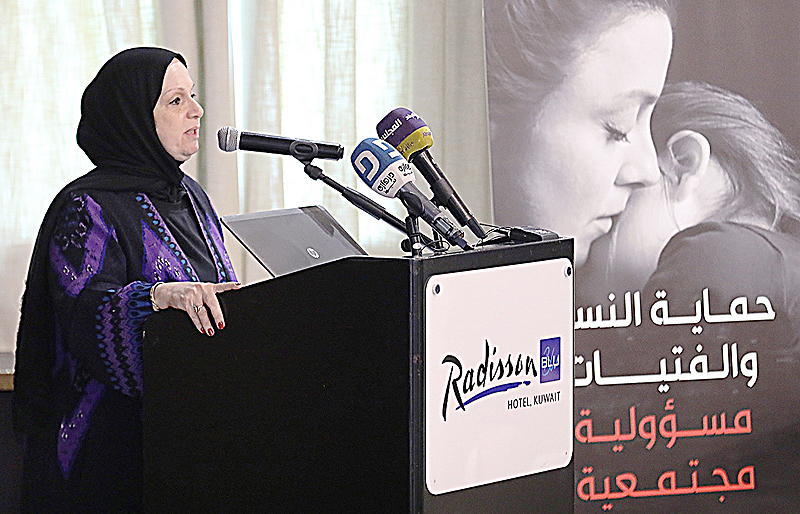Research center hosts workshop on ending violence against women and girls
KUWAIT: The Women's Research and Studies Center (WRSC) at the College of Social Sciences at Kuwait University hosted a workshop yesterday to raise awareness on ending violence against women and girls in Kuwait. The event took place under the patronage of the General Secretariat of the Supreme Council for Planning and Development (GSSCPD), in partnership with UN Women and the United Nations Development Program (UNDP) in Kuwait, and in collaboration with the Central Statistical Bureau, and Promundo, a non-government organization that has conducted the study in four Arab states.
The workshop drew the participation of Dr Khaled Al-Mahdi, Secretary-General of GSSCPD, Dr Lubna Al-Kazi, Director WRSC, Hideko Hadzialic, Resident Representative of UNDP in Kuwait, and Josephine Moss, Coordination specialist at UN Women. The event was held within the framework of the project 'Support the State of Kuwait in the implementation of SDG 5 on Gender Empowerment' and in line with the 2030 Agenda for Sustainable Development and Kuwait's National Development Plan (KNDP) 2015-2020.
The workshop unveiled the results of Kuwait's first 'International Men and Gender Equality Survey' in the Middle East and North Africa (IMAGES MENA). Conducted in 2018, the first exercise of its kind in the GCC region focused on gender empowerment, domestic violence, personal experiences, and men's and women's attitudes and practices in this regard. Having surveyed more than 1,900 Kuwaiti men and women aged 18-59, it is one of the most comprehensive household studies in the region. The findings have confirmed significant support for protecting women and girls' rights in Kuwait.

Equal rights
The survey provides fascinating insights into the perception of women's economic and educational empowerment in the country. For instance, 90 percent of women and two thirds percent of men believe wives and husband have equal rights to work outside the home. On the other hand, 48 percent of men think that should resources be scarce, it is more important to educate sons than daughters.
In terms of protecting women and girls' rights, 75 percent of men and 90 percent of women support laws raising the minimum age of marriage to 18 and criminalizing domestic violence. An impressive 100 percent of women and 98 percent of men are in favor of criminalizing sexual harassment.
Examining men's and women's roles in childcare, the survey reveals that around 90 percent of fathers have attended at least one antenatal visit, and more than 75 percent were present at the birth of their youngest child. Meanwhile, 79 percent of men and 93 percent of women discuss personal matters with children.
As for the perception of marriage, more than 80 percent of women and 50 percent of men believe in a woman's right to initiate divorce. However, more than 80 percent of men and half of all women surveyed think divorce will lead to the breakdown of society.
Ending violence
Dr Khaled Mahdi, Secretary-General of GSSCPD, said: "It is imperative that we work together to end violence against women. We must tackle the root causes of it, and adopt a systemic and comprehensive approach that recognizes and protects women's full and equal human rights. In this workshop today, we are bringing to light the results of our country's first national survey on ending violence against women and girls. Together with the help of the WRSC, we are supporting Kuwait in implementing the fifth objective of the United Nations' Sustainable Development Goals on achieving gender empowerment for women and girls."
Hideko Hadzialic, Resident Representative of UNDP in Kuwait, said: "We need to enable women to live a life of equality. Ending violence against women is one of UNDP's priorities and part of our mission to realize women's empowerment."
On behalf of UN Women Regional Office for the Arab States, Josephine Moss, Coordination Specialist, commended Kuwait and national stakeholders for their leadership in implementing this ground-breaking study and said: "Kuwait's innovative approach offers a model to other countries in the GCC region and beyond, to obtain the data to inform policies that will facilitate women's full and effective participation in national development.
Speaking at the event, Dr Lubna Al-Kazi, Director of WRSC, said: "Unfortunately, many women today still face violence in their lives, therefore protecting women and girls against violence is a social responsibility. The findings of IMAGES MENA Kuwait shed light on a harsh reality that we need to acknowledge and prevent. The survey has been an eye opener, proving that it is imperative to implement strategies to protect women in Kuwait, elevate their status and promote gender-positive policies across the board."
The workshop also provided an opportunity to learn from the experiences of other Arab countries where IMAGES MENA Kuwait was conducted and explore how they utilized the findings and recommendations for programming purposes. The event included a presentation of WRSC's action plan to end violence against women in Kuwait.







